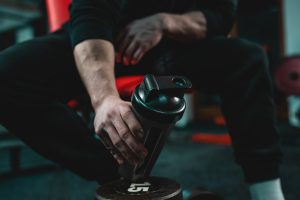Testosterone is the juice that revs men’s engines. This hormone plays a vital role in your sex drive, strength, fat distribution, mood, and energy. Unfortunately, most men’s testosterone levels begin dropping once they reach their late 30s. After 40, testosterone levels decrease by around 2% each year. Some men also experience low testosterone (hypogonadism), which has symptoms like low libido, loss of energy, and weight gain.
The good news is that exercising may help increase testosterone – to a certain extent. So keep reading to learn more about how to exercise to increase testosterone (and when exercise isn’t enough).
The Link Between Exercise and Testosterone
Exercise does raise testosterone levels, but not in the way that you may think. Moderate and high-intensity exercise temporarily increases total testosterone (low-intensity exercise does not have the same effect). However, the boost in testosterone is gone 30 minutes after the workout is complete.
However, regular exercise can raise testosterone in two ways:
- Exercise builds muscle. The more muscle mass you have, the higher your testosterone levels.
- Exercise burns calories, which may increase weight loss. Obesity is directly linked to low testosterone.
The key here is consistency. One workout will not affect your testosterone levels for very long, but working out regularly over time may help to balance your hormones.
Unfortunately, the boost in testosterone may not be enough to make a difference if you have clinically low testosterone. However, if you have borderline low levels, regular exercise may be enough to raise your levels into the normal range.
What Are the Best Testosterone-Boosting Workouts?
When it comes to boosting testosterone, not all exercises are created equal. However, two forms of exercise have the best effect: resistance training and high-intensity interval training (HIIT).
Resistance Training
Resistance (strength) training is one of the best exercises men can do to increase testosterone. A 2007 study found that men who strength trained three days a week for a month increased their testosterone levels over time.
Lifting heavy weights, in particular, helps to boost testosterone. This is because weightlifting increases muscle mass, which triggers the body to produce more testosterone.
The best exercises to increase testosterone target the body’s largest muscle groups, including:
- Squat
- Deadlift
- Bench press
- Row
- Chin-up/pull-up
- Overhead press
- Push-up
To get the best results, perform two sets of three to five reps at 95% of your maximum effort. If you’ve never strength trained before, hire a trainer for a few sessions to help you work on your form. Good form is critical for preventing injuries.
High-intensity Interval Training (HIIT)
HIIT workouts combine short, intense bursts of exercise with periods of rest or lower-intensity exercise. As a result, HIIT burns a lot of calories in a short amount of time and helps to reduce body fat, which can improve testosterone levels.
HIIT has several advantages over weightlifting:
- Many HIIT exercises are bodyweight-only, meaning they’re easy to do while traveling or without leaving home.
- The workouts are shorter in duration than typical weight-lifting sessions, making them easier to squeeze into a busy schedule.
Exercises in a HIIT workout may include:
- Bicycle crunches
- Box jumps
- Burpees
- High knees
- Jumping lunges
- Mountain climbers
- Plank jacks
- Speed skaters
- Sprints
The easiest way to try HIIT is by downloading an app like Seven. The app (and its competitors) recommends exercises and has a stopwatch functionality that tells you when to move and when to rest.
What Exercises Decrease Testosterone?
Chronic endurance cardio exercise has been shown to decrease testosterone. High-endurance athletes like professional cyclists tend to have higher cortisol levels, which has the opposite effect of testosterone.
However, that doesn’t mean you’re off the hook regarding cardio. Unless you’re running marathons, cardio will not lower your testosterone levels. In fact, cardio may help to reduce your weight which can, in turn, improve testosterone levels. In addition, moderate cardio exercise promotes heart health.
Timing Matters
Exercising in the afternoon is the best for boosting testosterone. However, many men feel too tired after work to go to the gym. If this is the case for you, taking a pre-workout supplement may help.
But the bottom line is that you should work out whenever it fits best into your schedule. Even a short workout at a sub-optimal time is better for your testosterone levels than no workout at all.
When Working Out Isn’t Enough to Increase Testosterone
As we mentioned before, exercise probably isn’t enough to raise testosterone levels for men with clinically low testosterone. But if you’re a man with low testosterone



